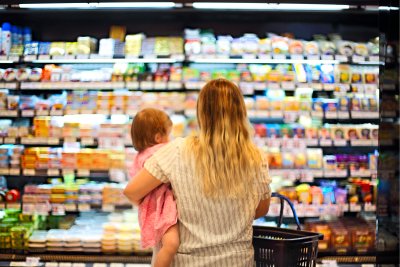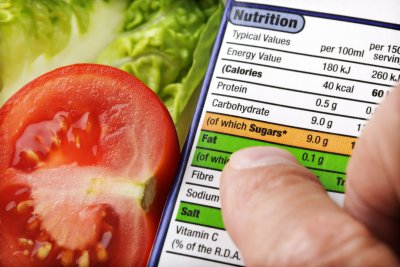 Children in a supermarket. Copyright: 2023. Provided by Impact on Urban Health licensed via a CC BY-NC-ND 4.0 license
Children in a supermarket. Copyright: 2023. Provided by Impact on Urban Health licensed via a CC BY-NC-ND 4.0 license

Government to introduce new "healthy standard" for food industry
Health and food organisations have welcomed new plans requiring the food and drink industry to report on the overall healthiness of their sales, with possible targets to follow in the future.
The Department for Health and Social Care has called for "A Healthy Revolution", with plans for mandatory reporting and targets for large food and drink companies. According to the announcement, retailers including supermarkets will be set "a new standard" to make the average shopping basket of food and drink "slightly healthier".
The Government estimates that a reduction of just 50 calories intake per day could prevent obesity for up to two million adults and 340,000 children.
In the Government announcement, Secretary of State for Health and Social Care Wes Streeting said:
"This government’s ambition for kids today is for them to be part of the healthiest generation of children ever. That is within our grasp. With the smart steps we’re taking today, we can give every child a healthy start to life.
Through our new healthy food standard, we will make the healthy choice the easy choice, because prevention is better than cure".
Responding to the announcement, Children's Food Campaign Manager Barbara Crowther says:
"Parents overwhelmingly say that it's getting harder, not easier, to feed children healthily, and overwhelmingly our shop shelves are full of heavily processed products high in fat, salt and sugar. It is absolutely right for the government to focus on getting the food and drink industry to play its part in rebalancing their sales towards healthier options, and requiring companies to report on how they are doing that is a very smart first move.
Mandatory reporting of the health of sales is a useful foundation stone, providing more transparency of information and hopefully an incentive for food companies to shift their sales to more nutritious and healthy options.
However, a full healthy revolution is likely to need more than mandatory reporting, and getting the food industry to sign up to targets is likely to take years. The Government should also look to create some upfront incentives for manufacturers too, which would help drive faster progress. We've seen how the Soft Drinks Industry Levy has done this, by dramatically reducing sugar in drinks. Similar levies applying to levels of salt, sugar or calories across a much wider range of foods would not only accelerate action to make products healthier, but any revenues raised could also be used to support healthy eating programmes, such as fruit and veg subsidies for lower income families."
The moves have also been welcomed by the Recipe for Change campaign, led by Sustain, Obesity Health Alliance, Food Foundation, British Heart Foundation, Action on Salt and Sugar, with support from Impact on Urban Health. The campaign is calling on the Government to introduce further levies on unhealthy food and drink, with any revenues generated to be invested in children's health and access to food programmes.
Katharine Jenner, Director of the Obesity Health Alliance, said:
“This is a fair and evidence-based prescription for better health; businesses urgently need the government to level the playing field to help them focus on selling products that help people live well.
The government has rightly identified the root cause of obesity-related ill health: a food system that makes healthy eating difficult. Crucially, it puts the spotlight on the food industry and commits to holding it accountable for providing healthier options – rather than placing the burden on individuals who are already struggling to get by.”
Ravi Gurumurthy, CEO of Nesta, who have been advising the 10 Year Health Plan and the food strategy, including proposals for future mandatory healthy food targets, said:
“Most of us want to lose weight and make healthier choices but the food that surrounds us makes that too hard. That’s why obesity has doubled since the 90s.
This new standard focuses on lots of small changes that make it easier to buy food that’s a little bit healthier. Nationally, it could send obesity rates down by a fifth – through business and government working together to improve our health.”
Anna Taylor, Executive Director of the Food Foundation
“The introduction of mandatory reporting by all large food companies, including takeaway chains, on the healthiness of their food sales is a game changer. This simple act of transparency delivers the opportunity for systemic change – informing better policy design and triggering Board room conversations. The data will also clearly reveal to consumers which businesses are on their side and making healthy choices easy, and which are making it actively harder for them to eat well. The faster this is introduced, the better.”
Sonia Pombo, Head of Impact and Research at Action on Salt:
‘We welcome the government’s recognition that supermarkets have a powerful role to play in shaping healthier food environments. This is a crucial step in tackling rising obesity rates and the growing burden of preventable diseases like cancer and cardiovascular disease. But voluntary efforts have repeatedly fallen short – what we need now is bold, enforceable policy.
The government must introduce mandatory, evidence-based targets for salt and sugar reduction, backed by meaningful financial penalties for non-compliance. This will help shift the responsibility away from individuals and toward a food system that truly supports healthier choices. Strong leadership, not just good intentions, will determine whether we can protect future generations from diet-related ill health.”
John Maingay, Director of Policy at the British Heart Foundation (BHF) said:
“A new standard to make shopping baskets across the UK healthier is a huge step towards creating a food environment that supports better heart health. This move recognises the vital role that businesses can play in supporting everyone to have a healthier diet.
Obesity puts people at greater risk of developing cardiovascular disease, which remains one of the UK’s biggest killers. We hope to see real momentum behind this new standard to make the healthier choice the easiest choice once and for all.”
Children's Food Campaign: Campaigning for policy changes so that all children can easily eat sustainable and healthy food.
Sustain
The Green House
244-254 Cambridge Heath Road
London E2 9DA
020 3559 6777
sustain@sustainweb.org
Sustain advocates food and agriculture policies and practices that enhance the health and welfare of people and animals, improve the working and living environment, promote equity and enrich society and culture.
© Sustain 2026
Registered charity (no. 1018643)
Data privacy & cookies
Icons by Icons8







